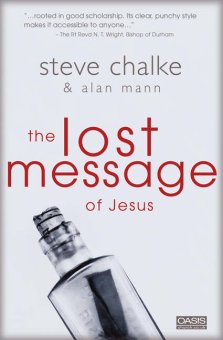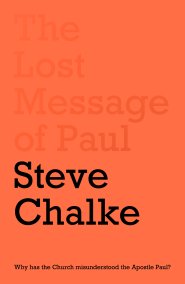I love reading and study so there is nothing I like more than freshly ground coffee and a thought provoking book. Sadly, this latest tome from Steve Chalke offers neither subtle flavour nor scholarly insight. Steve doesn’t do subtle, but he does do caricature to such an extent that this book angered me in a way that no good scholarly work ever has. I enjoy being challenged and made to think but this work is so full of misrepresentations it borders on chicanery and is cartoon-like in its portrayal of historical or modern Christian theology. Steve tries to sidle up and whisper in your ear like a friendly uncle, appealing to fear and misinformation that he claims to be believed by most of the church. He alleges that the Apostle Paul has been badly misunderstood and countless Christians and the world judge, him to be a pariah (p8), but the good news is, Steve has found the true Paul, in the wreckage of this misrepresentation by the church. For, Paul wasn’t a Christian but a Jew (p33) argues Steve, and a Second Temple Jew at that, so those who thought this man born in Tarsus, with dual citizenship, would be able relate to the Gentile as their Apostle, would be badly mistaken. For in fact, his Jewishness so defined him as make his teachings inscrutable to the average Western Christian, but fortunately for the world, Steve is around to provide the correct lens to understand and discover the lost teachings of the Apostle. With Gnostic prescience Steve is able to bring the correct interpretations on ‘faith’ and ‘salvation’ using in part a focus enabled by the school of the New Perspectives on Paul, with Ed Saunders and his disciples (p22), anchoring Paul’s perspective firmly into 520 BC. This key is so foundational that to miss it is to lock yourself out of the truth and into the fear mongering of the modern church with its focus on sin and hell. Steve several times mentions that he has been given the shivers by this false Christian theology which has persisted for nearly 2,000 years. He states that the cross is not central to the Christian message and didn’t become this until the 5th century - and any reference to it being hidden as a forbidden symbol of the persecuted church, is conveniently overlooked. Even though in the catacombs there are many examples both in plain sight and hidden in anchors, and of course the Chi-rho symbol, formally adopted by the first Christian Emperor in 312 AD and then after Christians began to be tolerated following the Edict of Milan (313 AD), the cross started to be used less covertly, but all this is missed and interpreted as an indication that the cross is as foreign to early Christianity as sound teaching is to the contemporary church. And don’t start Steve on Martin Luther, as this flawed German is dealt the fatal blow by overlooking all his early writings to merely note his most controversial piece written in later life that was anti-Semitic (p47). So, the great Reformer is now rubbished into silence as part inspiration behind the Nazi holocaust! Clearly, Luther is now kryptonite to Steve’s superman vision of Paul, so has been silenced as generally toxic, unscholarly and irrelevant. Luther clearly didn’t understand ‘grace’ and his fearmongering and conversion in the tower of Wittenburg was not towards grace, but strangely biased him further towards works? All Luther’s struggles with a work based faith (confession, penance and indulgences etc.) is totally ignored and his emphasis on ‘Sola Fide’ claimed to put ‘faith’ more firmly into the category of a work (p105). Besides, for Steve, a Hebrew is saved not by faith but by his DNA, in being one of the Chosen Race, but Luther didn’t understand this (p59) and the true grace of God avoided his reasoning. Ironically, then Steve alleges that Luther’s faith is empty of behavioural change, that it is without works (p63) and is merely a call for intellectual ascent (p60/80). So, the problem is how much faith do you need to be saved (p64) - this at least is novel if not slightly ridiculous. This results for Steve in ‘salvation anxiety’ (p64) which has haunted him, and is all due to a misunderstanding of the Greek word for ‘faith’ which is not really ‘faith’ at all but ‘faithfulness’ and does not refer to the believer but the Saviour Himself (p215). Steve fails to acknowledge those other pesky Hebrew words for ‘trust’ and all references to belief and faith in the Old Testament and elsewhere, as they might remove a load bearing card. Here you will notice that there is truth, we are saved by Christ’s faithfulness, but Steve’s great skill it to stack the deck in such a way, that you are left with half-truths and unnuanced statements that when taken alone might seem plausible to those who have not read much Scripture or theology and like the Chick tracts of old, reduce the complex into the overly simple and thus plausibly lead people to a poor conclusion or even, preferably for Steve, to new ‘revelations’. Steve’s revelations are wonderful in their simplicity but incredible in that most of Christendom has missed these for so long? Like the Messiah, Steve Chalke has been a long time coming! Luther, Calvin and the other Reformers, took the church from indulgences and led them into a theology of straw that makes faith a work (p84ff), that is of no value and just leads to fear and salvation insecurity which is all wrong because our faith is irrelevant as Jesus has done everything for us, and his faithfulness is redemptive - whether you care to follow him or not. Steve, is claiming to be revolutionary, holding the banner of a New Reformation, but in reality there is little new here at all. His key is love: ‘God is not wrath; God is love’ (p125 c.f. p115). Except Steve’s definition of love is much like that of John Fletcher of the 1960’s who gave us Situational Ethics, and whilst he argues we need to get away from the sentimental theology of the west (p143) he indulges in such himself, gushing as a father who would never stop loving his child no matter how they behaved and projects that human sentimentality, like the German Philosopher Ludwig Feuerbach, upon God. Because any father would feel this way, it is self-evident that God must. Therefore, Steve defines for us the nature of God’s love and not God himself. Besides, the first couple didn’t ‘sin’ but ‘stumble’ (p124) which is not a fall but a loss of innocence for Steve. This however, makes God’s banishment from Eden a bit of an overreaction for a mere ‘stumble’? Not much divine love or grace there then. This leads to one of his great hates that of God’s wrath and judgement (hence his dislike of cross imagery). God is not a God who judges because ‘that’s not love - it’s megalomania’ (p126). Rather, sin is punished in the present consequences and not in the future (p128). So, Jesus is not experiencing the wrath of God on the cross - that thought is alien to Paul - (p139) rather the picture is not that of sacrifice as divine sponge. Jesus absorbs evil into himself through the cross in a way more reminiscent of a Steven King novel than the Bible (p141). Jesus literally sucks up the injustice and sin of humankind. When we come to the idea of hell Steve starts to use familiar language and alleges any concept of a judgement resulting in hell as tantamount to an abusive parent that would have any decent human being reaching for the phone and the digits 999! Why? Because God excludes no one, rather all are invited to heaven and furthermore Jesus has achieved salvation for all by his faithfulness, thus the qualifying criteria is merely being human (p180). So, ‘Paul’s theology is thoroughly collective’ (p197). Sadly, Steve so takes away free-will and personal consequence that he makes the Gospel bad news for those who want to reject God, because you can’t! Your decisions are irrelevant in salvation terms as you are loved by God to such an extent that Steve turns love into suffocation, the kind of love that is coercive and doesn’t allow for rejection. In Steve’s dismissal of the concept of hell as child abuse, he fabricates an image of God as a divine stalker who literally will not let you go (p251), everyone is in (pp272, 280-1, 289), even if you don’t want to be! Chalke has already rubbished Luther for his contribution to German National Socialist ideals during the 1930’s but then strangely adopts as his authority two theologians who were actually part of the Nazi war machine, and a third, the German Philosopher Friedrich Nietzsche (p279), whose writings conceived the ‘superman’ concept (Übermensch) that so inspired Hitler and German National Socialism in their ideal of the Master Race. Is it me, or is Steve being inconsistent here? Finally, and most sadly, there is an arrogance to Steve’s writing that borders on hubris. He seems to see himself as the new Luther (p280), and the ultimate Reformer for the 21st Century Church (p98). It is here that this book most disturbs me, as it appears Steve has swallowed his own myth. In short, this is a book best left on the shelves.
Trustpilot









